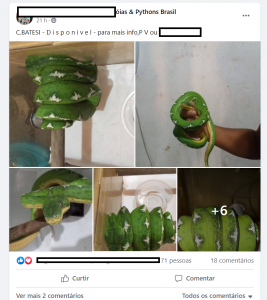Amazon snakes sell for up to 40,000 dollars each, says report
A study that made an in-depth diagnosis of the illegal trade in wild animals in the Brazilian Amazon, contains frightening data about this illegal activity.
BRASíLIA, DF, BRAZIL, January 21, 2025 /EINPresswire.com/ -- Brasilia - 25,000 hummingbirds captured to be used as decorations on candy boxes and 400,000 birds exported to Europe - to have their feathers used as raw material in the manufacture of fans - are just a few historical figures that help make up a detailed study on the illegal trade in wild animals in the northern region of the country. Produced by the Brazilian Network to Combat Wildlife Trafficking (RENCTAS), the Report on Wildlife Trafficking in the Brazilian Amazon shows that, over the years, this illegal activity has continued to cause major damage to biodiversity conservation in the region.
Based on online monitoring of illegal animal trade groups in the Amazon, as well as data from wildlife seizures by environmental agencies, the study provides a historical overview of the impact of wildlife trafficking in the region. International advertisements for the sale of Amazonian species also served as the basis for a detailed analysis of this environmental crime. Over the course of a year, Renctas technicians tracked down around 5,000 messages on social networks in order to identify and map the main characteristics of this criminal activity, such as the collection sites, the routes used by traffickers and the destinations of the captured animals.
For the general coordinator of Renctas, Dener Giovanini, the document fills an important gap: "until now, the most reliable documents on animal trafficking in the Amazon had been produced by two Parliamentary Commissions of Inquiry (CPIs): the Biopiracy Commission and the Animal Trafficking Commission. The final reports of these CPIs - produced with the collaboration of Renctas itself - already drew attention to the problem, but what was missing was an update showing the impact of the internet on this scenario, which Renctas has now done."
The document points out another major concern: the Amazon has also become one of the main entry points for exotic animals into Brazil, particularly through the borders with French Guiana and Suriname. Many venomous species, such as spiders, scorpions and snakes, are imported from African and Asian countries and head straight for the region, where surveillance is weaker, mainly due to the territorial extension and the presence of clandestine airstrips for private flights.
The Renctas report also provides a ranking of data that helps to understand the strategies used by animal traffickers and, in particular, important information for the creation of public policies to tackle the problem, such as the most vulnerable border areas and the most sought-after species.
Far beyond macaws and parrots
When it comes to animal trafficking, the image of macaws and parrots in cages almost always occupies the popular imagination, but the illegal trade in Amazonian fauna has many other characters that are almost never remembered, such as spiders or butterflies. Due to their rarity, beauty and even the potency of their venom, these groups of animals have become increasingly sought after and, above all, have achieved significant values on the illegal market. A single specimen of a species of butterfly endemic to the Tapajós River, for example, can sell for hundreds of euros on the international market.
"Some species of snake, such as the Emerald tree boa (Corallus caninus), are offered for around 40,000 dollars each in Europe. This is a trade that brings no benefit to Brazil and, above all, to the traditional communities of the Amazon biome, who are also exploited by illegal animal traders, often exchanging the animals for food," says Giovanini.
To download the report go to: https://renctas.org.br/trafico-de-animais
For more information: www.renctas.org.br /cgeral@renctas.org.br / @renctas
Dener Giovanini
RENCTAS
+55 61 3550-7227
dg@renctas.org.br
Legal Disclaimer:
EIN Presswire provides this news content "as is" without warranty of any kind. We do not accept any responsibility or liability for the accuracy, content, images, videos, licenses, completeness, legality, or reliability of the information contained in this article. If you have any complaints or copyright issues related to this article, kindly contact the author above.

